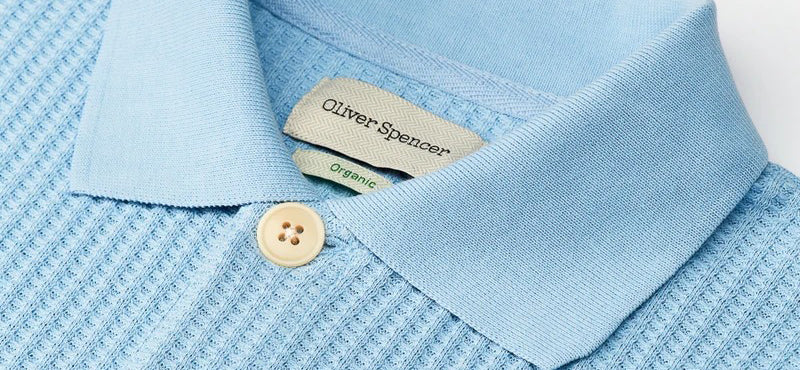We're proud to be able to say that this season our collection consists of more organic cotton than ever before (and the same goes for AW21 later this year). Every season we set ourselves the target to be more organic than the last, and so far we're sticking to the plan. From shirts and jersey to micro-cord, we've used organic cotton wherever we could. We're also seeing a healthy increase in the types and diversity of organic cotton from the mills and are excited about the textiles that will be available in the new future. Moreover, we've also upped our use of linen, which is a a fantastically sustainable fabric. Our organic cotton is very carefully sourced for its provenance on the one hand, and texture and handle on the other. Not only is it the more sustainable and environmentally responsible option, but the end product - feels super soft and comfortable, too.


TABLEY POLO SHIRT |
TABLEY POLO SHIRT |
TABLEY POLO SHIRT PAVIS NAVY |
For all too long, the fashion industry has been one of the world's worst industries for environmental damage, waste and social responsibility. The number of garments produced annually has doubled since 2000 and exceeded 100 billion for the first time in 2014. An estimated 92 million tons of textile waste is created annually from the fashion industry and every second, the equivalent of one garbage truck of textiles is landfilled or incinerated.

From excessive landfill to illegal factory conditions for workers, the fashion industry has largely had its head in the sand up until quite recently - brands and consumers alike are now demanding more from the industry, requesting supply chain transparency, provenance of materials and many other guarantees that the manufacturing process is sustainable and socially responsible.


BLENHEIM JUMPER |
BLENHEIM JUMPER |
BLENHEIM JUMPER |
At Oliver Spencer, part of our DNA has always been an honest assessment of our social and environmental impact. We were one of the first British brands to make organic cotton a fundamental part of our business for example, and continue to produce more organic cotton products from one season to the next, with the aim of being 100% organic in the near future.

Mills are beginning to see things our way too, which will only speed up the process. Committing to organic once meant a tiny selection of fabrics to choose from, but that is changing now as mills react to the demands of a growing number of manufacturers around the world.
The question we still get asked often is 'Why?' Most people will correctly assume that organic cotton is better for the environment than non-organic processes but that assumption might not be enough to change their shopping decisions. In fact, the why is much more complex than you might think.
Organic cotton production is both a restorative and regenerative practice for agriculture. Re-building soil health, water cycles, protecting biodiversity both above and below soil is essential for our future and organic farming is key to all of this. Organic production plays a pivotal role in climate change minimisation, primarily because organic farming systems are more effective than conventional systems at capturing CO2 from the atmosphere and sequestering it in the ground as organic matter.
|
RYDE BOMBER JACKET |
JUDO TROUSERS |
SOLMS JACKET |
Organic farming techniques also promote more resilient soils that can better withstand extreme weather through locking in water and nutrients. Furthermore, the practice of crop rotation, which is integral to organic farming, gives farmers a safe source of food and alternative incomes if cotton crops fail.
|
DOCK POPOVER |
DOCK POPOVER SHIRT |
JUDO TROUSERS |
In 2019, organic cotton had its second biggest harvest on record, with a total of 19 countries producing the world supply. India and China are the forerunners, with Kyrgyztan, Turkey, Tajikistan, Tanzania and the US making up the bulk of the rest. Developing countries like Pakistan are producing ever more organic cotton, which is vitally important when you consider that one quarter of its GDP comes from agriculture. Crop failure then, has far-reaching consequences.
It's important then that we seek out organic cotton alternatives when we're shopping. Increasingly more brands are committing to going 100% organic in the next 5 years, including the luxury fashion group Kering. Critical mass both on the production and consumer sides will mean organic cotton demand will swell to an eventual tipping point, when cotton and organic cotton are one and the same thing, but we've got a way to go yet. In the meantime, just know that when you choose organic over traditionally farmed cotton, you are sending a message to the brands you shop from.


CLEMSON SWEATSHIRT |
PABLO KNITTED POLO |
RUNDELL JERSEY CARDIGAN |
This season, we've expanded our organic cotton usage throughout the pillars of the collection. Where once it was the sole reserve of shirting, you'll now find organic cotton throughout our knitwear, tailoring, tees, polos and jerseys, too. To explore the full organic collection alongside our ecological fabrics, click here.
For a really in-depth look at the organic cotton market, the Textile Exchange has a very informative paper that you can read here.














